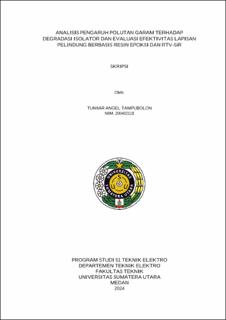Analisis Pengaruh Polutan Garam terhadap Degradasi Isolator dan Evaluasi Efektivitas Lapisan Pelindung Berbasis Resin Epoksi dan RTV-SiR
Analysis of the Effect of Salt Pollutants on Insulator Degradation and Evaluation of the Effectiveness of Protective Coatings Based on Epoxy Resin and RTV-SiR

Date
2024Author
Tampubolon, Tumiar Angel
Advisor(s)
Siregar, Yulianta
Metadata
Show full item recordAbstract
Insulators in power transmission and distribution systems function to isolate energized and non-energized parts. In Indonesia, outdoor insulators are typically made of ceramics and glass, which have weaknesses in humid and polluted conditions. Pollutants on the insulator surface and wet weather increase leakage current, leading to heating losses and insulation failure. The solution for insulator resistance to humidity and pollutants is hydrophobic coating. This study examines the effect of RTV silicone and epoxy resin coatings, and air humidity on leakage current and voltage distribution of string insulators in clean and polluted conditions, and the impact of pollutants on insulator performance. Laboratory experiments show leakage current of uncoated insulators ranges from 196.9 μA to 968.2 μA, RTV silicone-coated from 92.5 μA to 645.3 μA, and epoxy resin-coated from 93.3 μA to 548.8 μA. The average reduction in leakage current by RTV silicone coating is 48.2% and by epoxy resin coating is 44%. Leakage current increases with rising air humidity and pollutant weight on the insulator surface. Analysis indicates that coating worsens voltage distribution, evidenced by increased voltage distribution uniformity factor in polluted and humid conditions.
Collections
- Undergraduate Theses [1534]
